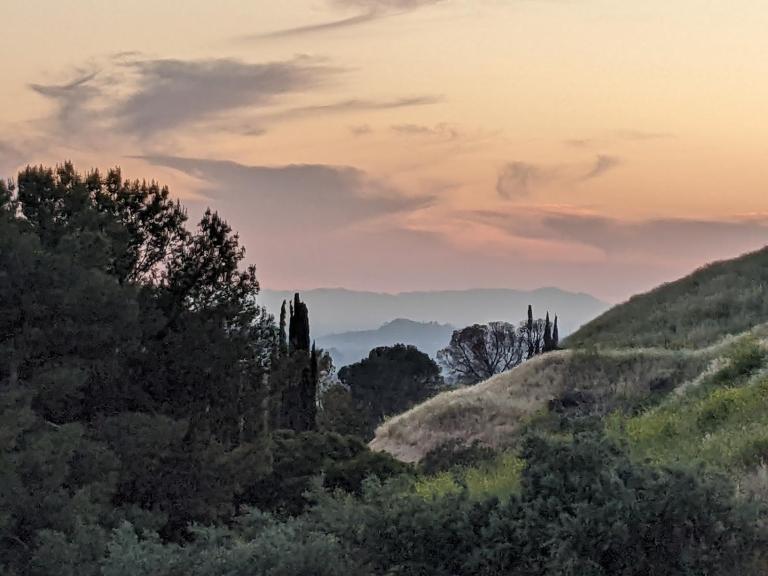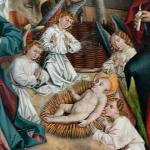
by James Ishmael Ford
(A Dharma talk republished here with permission by Roshi Edward Sanshin Oberholtzer, resident priest and guiding teacher at both the Joseph Priestley Zen Zangha and at Empty Moon Zen. First shared at our Empty Moon Zen zoom gathering at the end of November.)
The air here in central Pennsylvania is clear and crisp this afternoon. The corn has finally been harvested and replaced with a freshly plowed field ready to be planted with winter wheat. There had been a scattering of snowflakes as we drove up from Washington on Friday but it hasn’t yet left a visible trace on the ground. The birds on the back patio have let me know that they are annoyed that I haven’t yet refilled their feeder. And still, by some miracle, a few roses are blooming on the bushes out front. Life, if I try not to speculate about the near future, life is good. As I was making the morning oatmeal and nursing a mug steaming with hot coffee, I remembered a poem by Jane Kenyon. It goes:
I got out of bed
on two strong legs.
It might have been
otherwise. I ate
cereal, sweet
milk, ripe, flawless
peach. It might
have been otherwise.
I took the dog uphill
to the birch wood.
All morning I did
the work I love.
At noon I lay down
with my mate. It might
have been otherwise.
We ate dinner together
at a table with silver
candlesticks. It might
have been otherwise.
I slept in a bed
in a room with paintings
on the walls, and
planned another day
just like this day.
But one day, I know,
it will be otherwise.
This is the last day of November. Winter, wrapped in dark clouds, is creeping towards us just over the hills to the west. The snow blower needs to be tuned up for the storms to come. My wife has placed snow markers out at the end of the driveway hoping to ward off the county snow plows. The sourdough starter needs tending in anticipation of a winter’s worth of bread loaves all waiting for the apple butter sitting in jars that have been put away in the basement along with cases of beans and boxes of kleenex. Yet all of this preparation feels like an evasion, a denial of the political storms to come, of the effects they’ll have on family and friends, friends and relatives already fearful of what is looming there together with those winter storm clouds. And for all those things that, in a different world, might have been well but will be otherwise, that day is upon us. So where do we turn?
When I lived out west in Oakland I would walk up to our local grocery store on a Sunday morning past a Samoan church that, weather permitting, held its services with the doors and windows wide open. A Samoan choir is a beutiful thing to be blessed by on a morning walk, a kind of sanctuary in what was a crime-ridden neighborhood. I’m occasionally now in Washington, DC on a Sunday morning and, passing the local AME church get to hear “Rock my soul in the bosom of Abraham” sung out by the congregation. Some people know instinctually where to turn for refuge.
Some years ago, late at night in a room lit only by candlelight and after a long day of sitting in the zendo at Green Gulch Farm, we would chant:
Buddham saranam gacchami
Dhammam saranam gacchami
Sangham saranam gacchami
Dutiyampi buddham saranam gacchami
Dutiyampi dhammam saranam gacchami
Dutiyampi sangham saranam gacchami
Tatiyampi buddham saranam gacchami
Tatiyampi dhammam saranam gacchami
Tatiyampi sangham saranam gacchami
I take refuge in Buddha;
I take refuge in Dharma;
I take refuge in Sangha.
Once…..twice….three times..
But what do we mean by refuge? Perhaps we can find some meaning in one of those short pointers found in the Miscellaneous koans: Hide yourself in a pillar. Better yet, rock your soul in the bosom of Abraham. Without becoming too obvious about that pillar, the three refuges do not call upon us to conceal ourselves, to blend in, to become invisible any more than that congregation down in DC looks to hide in the bosom of Abraham, any more than Rosa Parks hid in that seat in the front of that Birmingham bus, any more than John Lewis hid on the Edmund Pettus Bridge. When we take refuge in the Buddha, when we take refuge in the Dharma, when we take refuge in the Sangha, we are the Buddha, Dharma, and Sangha.
We wrap ourselves in the Buddha’s teachings. We sit together, we chant together. We are in this whole mess together, and our ancestor Dongshan had a few words to say about this togetherness, perhaps a clue as to how to stand in that pillar, how to rock your soul in the bosom of Abraham, how to take refuge in the righteousness of justice. Dongshan, that wiley 9th century monk, the founder of our feast, as Bob Cratchett would say, the Dong in the Caodong that our Japanese brethern have rendered as Soto, naming our school of Zen practice; It was Dongshan who, in setting out his Five Ranks, gave us a roadmap to consider our relationship to the relative and the absolute, a roadmap that points the way to being upright while hiding, no, while being in that pillar, to taking refuge in the three treasures, to find, perhaps, a way through the torn and tattered path that lies ahead of us by seeing that we are that torn and tattered path.
For Dongshan saw that the two truths of the relative and the absolute, of form and emptiness, of samsara and nirvana, are, as Nagarjuna ahead of him pointed out, really one truth. As Hakuin pointed out, “This earth where we stand is the pure lotus land, and this very body, the body of Buddha.
Dongshan’s Five Ranks echo that much beloved and often confounding line from the Heart Sutra, spoken by the Bodhisattva Avalokiteshvara – “Shariputra, form does not differ from emptiness, emptiness does not differ from form. Form itself is emptiness, emptiness itself form” – and it rings the changes with those two terms: form within emptiness, emptiness within form, arriving within emptiness, approaching from form, and form and emptiness in concurrance, those five which are, in the end, one.
The lovely center of Dongshan’s examination of form and emptiness is the collection of verses accompanying the interplay of the essential and the contingent, verses that take us from the darkest night before the third watch through mirrors at daybreak, from the clean swept paths of emptiness and the particularity of a skilled hand, all leading to what we might have suspected all along, the identity of form and emptiness, an identity which brings us, just as the monk Hotai in the ten oxherding pictures entering the market place with bliss bestowing hands, to that quiet, simple place beside the hearth, nirvana and samsara one, fugitive and pillar one, each of us one with Buddha, Dharma, and Sangha. His final gift the verse:
Not following into being or nonbeing – who can be in accord with this?
All people surpass the ordinary current,
And becoming one with circumstances, want to return to the hearth and sit.
Dongshan offers us a kind of refuge, a hearth to turn to, to be one with, a bit of heaven in the midst of turmoil. I’ll think of that as winter comes on, as the fire crackles in the fireplace, a woolen blanket lays across my legs and a book of verse lies open on my lap, the poet Yeats reminding me that, however much the storm outside rages, however conflict arises, however powerless the pundits and politicians may be, there is still that quiet peace we might find returning to the hearth and sitting, sitting with Yeats and with this:
On being asked for a War Poem
I think it better that in times like these
A poet’s mouth be silent, for in truth
We have no gift to set a statesman right;
He has had enough of meddling who can please
A young girl in the indolence of her youth,
Or an old man upon a winter’s night.
A refuge, a pillar to stand with, here in Central Pennsylvania.













